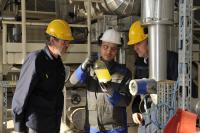
Taking a sample from the synthesis plant: professor Jörg Sauer, spokesman of the bioliq® project (right), with the operations manager of the synthesis plant, Ulrich Galla (left), and Daniel Richter... The pilot project funded by the Federation, State, and EU was implemented by KIT in cooperation with several industry partners. The investment totals EUR 64 million.
The bioliq® pilot plant at Karlsruhe Institute of Technology (KIT) is running successfully along the complete process chain. All stages of the process have now been interconnected: Flash pyrolysis, high-pressure entrained flow gasification, hot gas cleaning, and synthesis. bioliq® converts residual biomass into ecofriendly and engine-compatible synthetic fuels. "This is another important module for the success of the Energiewende," said the President of KIT, Professor Holger Hanselka, during the commissioning ceremony today. The pilot project funded by the Federation, State, and EU was implemented by KIT in cooperation with several industry partners. The investment totals EUR 64 million.
Undersecretary of State with the Federal Minister of Food and Agriculture (BMEL), Peter Bleser, emphasized: "As the bioliq® process is linked with decentralized production processes, it has the potential to enhance the creation of value in rural areas and produce both biofuels and basic chemical products for a biomass-based economy."
The Head of Department of the Baden-Württemberg Ministry of Science, Research, and the Arts, Dr. Simone Schwanitz, pointed out that the ministry will invest about EUR 13 million in the bioeconomy research strategy until 2019, the objective being to make the state fit for a future with a sustainable and economically efficient use of renewable resources: "Important fundamental research into bioeconomy results in competitive advantages for the state that assumes global responsibility. The bioeconomy strategy links biologically based economy with our strong research sector. The bioliq® pilot plant is an example of this approach."
The pilot plant produces gasoline of high quality that is ecofriendly and fully compatible with conventional gasoline. The plant output is about 1 t of fuel per day. In principle, the bioliq® concept also allows for the production of fuels for diesel engines and airplanes. As the bioliq® process is based on straw and other biogenic residues, for the cultivation of which no additional areas are required, it does not compete with food and feedstock production.
"Biomass as a renewable energy source is of essential significance to the Energiewende," said KIT President Professor Holger Hanselka. "With bioliq®, we now have a sustainable process for the efficient use of residues from agriculture and forestry, which can be applied on the industrial scale. The pilot plant at KIT does not only produce high-quality fuels, but also serves as an outstanding research platform for the development of new technologies and products."
Investments in the bioliq® large-scale project totaled about EUR 64 million. About half of this sum was financed from funds granted by the Federal Ministry of Food and Agriculture (BMEL) (EUR 27 million), the Baden-Württemberg Ministry of Science, Research, and the Arts (EUR 1 million), and the European Regional Development Fund (ERDF) (EUR 1 million). The BMEL funds were provided via the Fachagentur Nachwachsende Rohstoffe e.V. (FNR, central project-coordinating agency in the area of renewable resources). The funds of the ERDF were provided via the Baden-Württemberg Ministry of Finance and Economics (MFW).
Of the remaining investment costs, the KIT and the Helmholtz Association paid EUR 24 million, while the industry partners contributed EUR 11 million. The industry partners are the company Air Liquide Global E&C Solutions Germany GmbH, Frankfurt, for stages I (pyrolysis) and II (gas production), the company MAT Mischanlagentechnik GmbH, Immenstadt-Seifen, for the conditioning and storage of biosyncrude, the company MUT Advanced Heating GmbH, Jena, for stage III a (hot gas cleaning), and the company Chemieanlagenbau Chemnitz GmbH for stages III b and IV (fuel synthesis). The industry partners designed, delivered, assembled, and commissioned the bioliq® pilot plant and will also be involved in the future research and development work.
Following the commissioning of the complete process chain, the project now enters an optimization phase in order to further improve the stages of the process and the resulting products. The fuel produced by the pilot plant will be used for test purposes. It is also aimed at developing new fuels and fuel components to further improve the energy efficiency and emission rates of today's and new combustion engines.
bioliq® Process
The bioliq® process (Biomass to Liquid Karlsruhe) accounts for the fact that straw and other biogenic residues arise in a widely distributed manner and possess a low energy content and, at the same time, allows for an economically efficient large-scale production. The process comprises four stages: In the first stage, the dry residual biomass is subjected to decentralized flash pyrolysis to form a substance of high energy density similar to crude oil. This substance, the so-called biosyncrude, can be transported over long distances in an economically efficient way and is subjected to further central processing. The high-pressure entrained flow gasifier converts the biosyncrude into a tar-free synthesis gas at temperatures above 1200°C and pressures of up to 80 bar. This synthesis gas is mainly composed of carbon monoxide and hydrogen. By means of downstream hot gas cleaning, impurities, such as particulate matter, chlorine, sulfur, and nitrogen compounds, are separated from the syngas. In the synthesis stage, this synthetic gas is converted into customized fuels or basic chemical products.
Source: Karlsruher Institut für Technologie (KIT)
 Print Article
Print Article Mail to a Friend
Mail to a Friend
